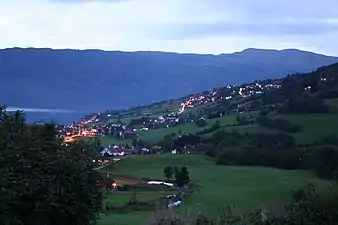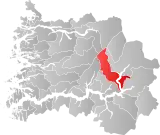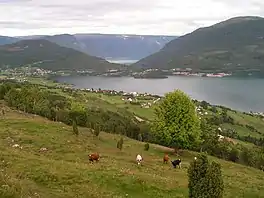Hafslo Municipality
Hafslo herad | |
|---|---|
 View of Hafslo | |
 Sogn og Fjordane within Norway | |
 Hafslo within Sogn og Fjordane | |
| Coordinates: 61°18′39″N 07°11′08″E / 61.31083°N 7.18556°E | |
| Country | Norway |
| County | Sogn og Fjordane |
| District | Sogn |
| Established | 1 Jan 1838 |
| • Created as | Formannskapsdistrikt |
| Disestablished | 1 Jan 1963 |
| • Succeeded by | Luster Municipality |
| Administrative centre | Hafslo |
| Area (upon dissolution) | |
| • Total | 583 km2 (225 sq mi) |
| Population (1963) | |
| • Total | 2,384 |
| • Density | 4.1/km2 (11/sq mi) |
| Demonym | Hafslobygding[1] |
| Time zone | UTC+01:00 (CET) |
| • Summer (DST) | UTC+02:00 (CEST) |
| ISO 3166 code | NO-1425[2] |
Hafslo is a former municipality in the old Sogn og Fjordane county, Norway. The 538-square-kilometre (208 sq mi)[3] municipality existed from 1838 until its dissolution in 1963. It is located in the present-day Luster Municipality (in Vestland county) in the traditional district of Sogn. The former municipality included the villages of Kinsedalen, Ornes, and Kroken on the east side of the Lustrafjorden. It also included the villages of Solvorn, Hafslo, Joranger, and the whole Veitastrond valley on the west side of the Lustrafjorden. The municipality surrounded the lakes Hafslovatnet and Veitastrondvatnet. The administrative centre of the municipality was the village of Hafslo, where Hafslo Church was located.
History
Hafslo was established as a municipality on 1 January 1838 (see formannskapsdistrikt law). During the 1960s, there were many municipal mergers across Norway due to the work of the Schei Committee. On 1 January 1963, the municipality of Hafslo (population: 2,384) was merged with the neighboring municipalities of Luster (population: 2,674) and Jostedal (population: 796) to form the new, larger municipality of Luster.[4]
Name
The municipality (originally the parish) is named after the old Hafslo farm (Old Norse: Hafrsló) since the first Hafslo Church was built there. The first element is the old male name Hafr, the name is identical with the word hafr which means "male goat". The last element is ló which means "clearing" or "meadow", probably due to the excellent farming areas nearby.[5]
Government
During its existence, this municipality was governed by a municipal council of directly elected representatives. The mayor was indirectly elected by a vote of the municipal council.[6]
Mayors
- 1838-1839: Ola Trondsen Lid
- 1840-1859: Einar Joranger
- 1860-1860: Samuel M. Bugge
- 1861-1861: C. Aars
- 1862-1862: Ola I. Fet
- 1863-1877: Samuel M. Bugge
- 1878-1881: Einar Joranger
- 1882-1885: Samuel M. Bugge
- 1886-1895: Ola I. Hillestad
- 1896-1898: Anders J. Tørvi
- 1899-1904: Erik Nitter Walaker
- 1905-1907: Samuel O. Moe
- 1908-1910: Erik Nitter Walaker
- 1911-1919: Ola I. Joranger
- 1920-1922: Wilken Nitter Walaker
- 1923-1928: Ivar O. Hillestad
- 1929-1931: Torstein Molland
- 1932-1937: J.W. Fraas
- 1938-1942: Torstein Molland
- 1942-1944: Amund Bremer
- 1945-1945: Torstein Molland
- 1946-1947: Ola Sjøtun
- 1948-1961: Einar Kjos
- 1961-1963: Hans H. Sjøtun
Municipal council
The municipal council (Heradsstyre) of Hafslo was made up of 21 representatives that were elected to four year terms. The party breakdown of the final municipal council was as follows:
| Party name (in Nynorsk) | Number of representatives | |
|---|---|---|
| Labour Party (Arbeidarpartiet) | 7 | |
| Conservative Party (Høgre) | 2 | |
| Christian Democratic Party (Kristeleg Folkeparti) | 3 | |
| Centre Party (Senterpartiet) | 5 | |
| Liberal Party (Venstre) | 3 | |
| Local List(s) (Lokale lister) | 1 | |
| Total number of members: | 21 | |
| Party name (in Nynorsk) | Number of representatives | |
|---|---|---|
| Labour Party (Arbeidarpartiet) | 7 | |
| Conservative Party (Høgre) | 3 | |
| Christian Democratic Party (Kristeleg Folkeparti) | 3 | |
| Farmers' Party (Bondepartiet) | 5 | |
| Liberal Party (Venstre) | 3 | |
| Total number of members: | 21 | |
| Party name (in Nynorsk) | Number of representatives | |
|---|---|---|
| Labour Party (Arbeidarpartiet) | 9 | |
| Conservative Party (Høgre) | 5 | |
| Farmers' Party (Bondepartiet) | 8 | |
| Joint List(s) of Non-Socialist Parties (Borgarlege Felleslister) | 6 | |
| Total number of members: | 28 | |
| Party name (in Nynorsk) | Number of representatives | |
|---|---|---|
| Labour Party (Arbeidarpartiet) | 4 | |
| Christian Democratic Party (Kristeleg Folkeparti) | 1 | |
| Farmers' Party (Bondepartiet) | 2 | |
| List of workers, fishermen, and small farmholders (Arbeidarar, fiskarar, småbrukarar liste) | 5 | |
| Joint List(s) of Non-Socialist Parties (Borgarlege Felleslister) | 6 | |
| Local List(s) (Lokale lister) | 10 | |
| Total number of members: | 28 | |
| Party name (in Nynorsk) | Number of representatives | |
|---|---|---|
| Labour Party (Arbeidarpartiet) | 4 | |
| Liberal Party (Venstre) | 2 | |
| List of workers, fishermen, and small farmholders (Arbeidarar, fiskarar, småbrukarar liste) | 9 | |
| Local List(s) (Lokale lister) | 13 | |
| Total number of members: | 28 | |
| Party name (in Nynorsk) | Number of representatives | |
|---|---|---|
| Labour Party (Arbeidarpartiet) | 6 | |
| Conservative Party (Høgre) | 1 | |
| Farmers' Party (Bondepartiet) | 7 | |
| Liberal Party (Venstre) | 4 | |
| List of workers, fishermen, and small farmholders (Arbeidarar, fiskarar, småbrukarar liste) | 1 | |
| Joint List(s) of Non-Socialist Parties (Borgarlege Felleslister) | 4 | |
| Local List(s) (Lokale lister) | 5 | |
| Total number of members: | 28 | |
| Note: Due to the German occupation of Norway during World War II, no elections were held for new municipal councils until after the war ended in 1945. | ||
Media gallery
 The Hafslo village area in the central part of the municipality
The Hafslo village area in the central part of the municipality The Ornes area in eastern Hafslo municipality
The Ornes area in eastern Hafslo municipality.jpg.webp) The Veitastrondsvatnet lake and the Jostedalsbreen glacier (northern end of the municipality
The Veitastrondsvatnet lake and the Jostedalsbreen glacier (northern end of the municipality Hafslo Church
Hafslo Church
Notable people
- Sylfest Lomheim (born 1945), a Norwegian linguist
- Jens Sterri (born 1923), a civil servant
- Kjellfred Weum (born 1940), a hurdler
See also
References
- ↑ "Navn på steder og personer: Innbyggjarnamn" (in Norwegian). Språkrådet.
- ↑ Bolstad, Erik; Thorsnæs, Geir, eds. (26 January 2023). "Kommunenummer". Store norske leksikon (in Norwegian). Kunnskapsforlaget.
- ↑ Helland, Amund (1901). "Hafslo herred". Norges land og folk: Nordre Bergenhus amt (in Norwegian). Vol. XIV. Kristiania, Norway: H. Aschehoug & Company. p. 58. Retrieved 28 September 2019.
- ↑ Jukvam, Dag (1999). Historisk oversikt over endringer i kommune- og fylkesinndelingen (PDF) (in Norwegian). Statistisk sentralbyrå. ISBN 9788253746845.
- ↑ Rygh, Oluf (1919). Norske gaardnavne: Nordre Bergenhus amt (in Norwegian) (12 ed.). Kristiania, Norge: W. C. Fabritius & sønners bogtrikkeri. p. 40-41.
- ↑ Hansen, Tore; Vabo, Signy Irene, eds. (20 September 2022). "kommunestyre". Store norske leksikon (in Norwegian). Kunnskapsforlaget. Retrieved 1 January 2023.
- ↑ "Ordførarar i Luster". NRK Fylkesliksikon (in Norwegian). 7 January 2004. Retrieved 17 June 2023.
- ↑ "Kommunevalgene og Ordførervalgene 1959" (PDF) (in Norwegian). Oslo: Statistisk sentralbyrå. 1960. Retrieved 16 February 2020.
- ↑ "Kommunevalgene og Ordførervalgene 1955" (PDF) (in Norwegian). Oslo: Statistisk sentralbyrå. 1957. Retrieved 16 February 2020.
- ↑ "Kommunevalgene og Ordførervalgene 1951" (PDF) (in Norwegian). Oslo: Statistisk sentralbyrå. 1952. Retrieved 16 February 2020.
- ↑ "Kommunevalgene og Ordførervalgene 1947" (PDF) (in Norwegian). Oslo: Statistisk sentralbyrå. 1948. Retrieved 16 February 2020.
- ↑ "Kommunevalgene og Ordførervalgene 1945" (PDF) (in Norwegian). Oslo: Statistisk sentralbyrå. 1947. Retrieved 16 February 2020.
- ↑ "Kommunevalgene og Ordførervalgene 1937" (PDF) (in Norwegian). Oslo: Statistisk sentralbyrå. 1938. Retrieved 11 May 2020.
External links
 Luster travel guide from Wikivoyage
Luster travel guide from Wikivoyage
